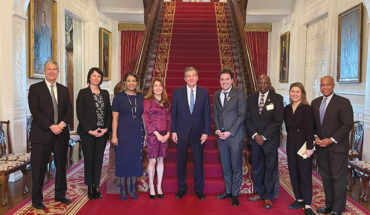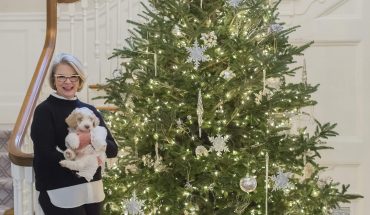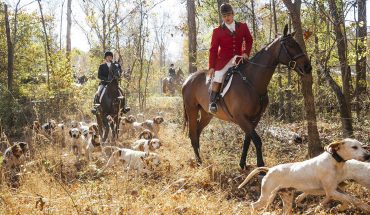
GREATEST GENERATION:
from left: Raleigh World War II veterans Banks Talley, Millie Dunn Veasey, Frank Mansfield, and Charles Johnson Jr.
by Karen Lewis Taylor
photographs by Robert Willett
At the national memorial in Washington, D.C., the fallen heroes of World War II are represented by a field of 4,048 gold stars – one star for each 100 warriors lost, or nearly half a million Americans.
Their surviving brothers and sisters in arms, more than 15 million strong, returned to a grateful nation and went quietly about the business of building a new America. Bolstered by the G.I. Bill that brought higher education and opportunity, they nurtured families and businesses, fought for social justice and equality, and ushered in an era of economic prosperity. The names of the members of this “greatest generation” are inscribed on buildings, bridges, and schools; they anchor scholarship funds and service awards; they’re woven into the fabric of the communities they shaped. Seventy years later, we still honor their sacrifice in facing down the gravest threat the world had ever known.
In celebration of Veterans Day, we share the stories of four Raleigh veterans whose service in World War II was only the beginning of a lifetime of contributions to our community and beyond.

MODEL SOLDIER: Frank Mansfield with a model of the SBD-5 aircraft, a plane that he flew aboard as a gunner during World War II.
“I’m still a Marine”
Frank Mansfield’s decision to enlist after the Japanese attack on Pearl Harbor gave him a sense of belonging that has stayed with him for 72 years. Orphaned in childhood, he was 20 years old and attending technical college, learning to build airplanes, when the U.S. entered the war. “I didn’t think of the war in terms of getting killed. I just knew I wanted to be part of the situation,” he says. “It was my country, and I felt I should do something.”
He joined the Marine Corps – in his journal from the war, he notes the Marines’ reputation as “a fighting, cussing bunch of fellows that were the first to go into any fight” – and was assigned to the VMSB-235 Aircraft Squadron in the South Pacific, where fierce battles against the Japanese were spread over dozens of islands.
“We’d go up and bomb the enemy, one island and then the next. The Japanese were doing it to us, we were doing it to them,” he remembers. “We lost a few people in a bombing the first night we were there. Most of us were in foxholes. We dove in, and I was with ten other fellows I didn’t even know. That was the first time I’d ever smoked – you could have cut the smoke with a knife.”
His technical training proved particularly useful. “My job was to certify that the planes were ready for flight every day,” he says. “I could tell a captain or major, and I was only a sergeant, ‘You can’t fly this plane today.’ ”
He earned the five stripes of a technical sergeant and returned to the States shortly before the war ended. After a year at Northeastern University, he married and settled in Raleigh, where he worked for Dillon Supply Company for 39 years.
“Being in the Marines taught me honesty – not that I wasn’t honest, but they drilled it into me – being on time, doing the job I was assigned to do,” he says. “I traveled all the time in my sales job. The company didn’t check on me, they depended on me to do the job.”
“I’m still a Marine, you know,” he adds. “I belong to a Marine Corps league, and we stick together. When any Marine dies locally, we go to the funeral and stand at the casket in full uniform through the whole service, respecting them for what they did.”
Mansfield’s service doesn’t end with the Marines. A past president of the Kiwanis Club of Raleigh, he has received numerous awards for community service, including the 2012 Fred Fletcher Volunteer Award for outstanding senior adult programs volunteer. A model train enthusiast and skilled woodworker, he has also maintained ties with the Boy Scouts of America, which he joined as a teenager in Boston.
“I think I’m the only man in Raleigh who’s a 75-year scout,” Mansfield says with a chuckle. A recipient of the Silver Beaver Award, scouting’s highest honor, he led Troop 10 at Edenton Street Church for 30 years, training 29 Eagle Scouts. Troop members have dedicated a scouting room in his honor.
At 93, he still carries his BSA coin, embossed with the reminder to do a good deed every day. Its surface is worn with use, testament to a lifetime of service and goodwill.

HONORED FOR SERVICE: Millie Dunn Veasey holds a medal she received on the 50th anniversary of World War II.
“I’d always known I could excel”
When Millie Dunn Veasey decided to join what would become the Women’s Army Corps at 24 in 1942, she figured she could serve her country as well as anyone.
“I had wanted to attend Virginia State University and become a stenographer,” she recalled in a speech in 1993, when women’s role in the military was gaining broad recognition. “We didn’t have the money. I’d always known that, given the opportunity, I could excel.”
Family members weren’t so sure. Veasey’s mother worried she wouldn’t pass her physical. Her brother Eugene, already in the Army, thought she was crazy to volunteer. Even Veasey, who had never been outside Raleigh, had misgivings.
“When I got to Fort Bragg I told them I’d changed my mind,” she said in her speech. “They told me I couldn’t change my mind.”
Veasey soon dispelled all doubts about her capabilities. She completed basic training and served stateside in various clerical roles. Assigned to Camp Maxey near Paris, Texas, she says, “I wrote my mother that I was going to Paris. I had no idea the next year I would actually be going to Paris!”
She made history when she shipped out with the 6888th Central Postal Battalion – the only all-black, all-female unit deployed overseas – under Major Charity Adams, who would become the highest-ranking black female officer in World War II. Veasey spent four months as company clerk in Birmingham, England, which experienced heavy bombing, and was in London on V-E Day. She then spent nine months as the battalion’s supply sergeant in France.
“It was really shattered,” she says of the landscape. “It was quite an experience, honestly.”
Although the “Six-Triple-Eight” was a segregated unit, Veasey notes she did not encounter much overt racism during her service.
“Some black women who were in the Army had different experiences, because they were at a camp where maybe they had a group of white women – this was during segregation – and white barracks. I was never on a post where there were two (separate divisions),” she says. Recalling Adams’ experience of being reprimanded for accompanying a white, male colleague to an officers’ club, she says, “Some of them witnessed some very terrible things.”
Veasey returned to a changing Raleigh. After convincing her new husband that she should continue her education, she became the first person in her family to graduate from college, eventually earning a master’s degree. She embarked on a 30-year career at Saint Augustine’s College, her alma mater. She joined the League of Women Voters.
She also got involved in the Civil Rights Movement, accompanying St. Aug’s students marching for integration. In 1963, as secretary of the Raleigh-Wake County NAACP, she sat with the Rev. Martin Luther King, Jr., at the March on Washington. She became the branch’s first female president in 1965.
Of her participation in the marches, Veasey has said, “I don’t think of myself as a hero. My approach is that you don’t ask persons to do… more than you’re going to do yourself.”
It was not until 1993 that Veasey began speaking about her wartime service. She has since embraced her history, serving as post adjutant for American Legion Post 157 for 20 years. Today, at 96, she is pushing for a Legion facility that will support North Carolina men and women of color who serve their country.
As with so many other things in her life, Veasey is sure to make it happen.
“I’m proud of what I did”
Charles Johnson Jr., was drafted into the Army’s 79th Infantry Division just three days out of high school. One year later, a week before his 19th birthday, he joined thousands of troops preparing for the Normandy invasion.
“The British crew on the landing craft told us, ‘If they’re shelling the beach, we’re going to drop your arse in deep water.’ Well, we had on these uniforms, carrying a rifle, hand grenades on our belt. If they’d have dropped us in deep water, we’d have gone – ploomp! – right to the bottom,” he recalls.
As it turned out, German shelling was concentrated several miles away. “We ran off that ship and right through some sand hills. Nary a shot was fired at us while we landed,” he says.
It was a lucky break for soldiers sent into some of the deadliest fighting of the war. They soon encountered scores of dead comrades just inland from their landing spot. Later, their location was accidentally bombed by their own Air Force. “That was a horrible event,” he says. “But we cut off the Cherbourg Peninsula, and all the Germans that were left surrendered to us.”
Over the next few months, Johnson’s division, now part of Patton’s 3rd Army, chased the retreating German forces across France, liberating towns and emptying prison camps along the way, before getting bogged down by a reorganized enemy at the German border.
“A lot of combat was occurring, us shooting at them and them shooting at us,” Johnson says. “I wrote my mother and said, ‘I’m convinced the war will never end. Sell my war bonds.’ Mentally, I was lost.”
Once the American forces persevered, Johnson was transferred to the 9th Army headquarters in Braunschweig. He still laughs about a ceremony with Russian officers held there to mark their shared success.
“They made us all get in our uniforms, looking good, and here came this convoy of Russian troops in the worst-looking vehicles you ever saw,” he says. “These Russian soldiers, they >>
had buckets of vodka in these horrible-looking trucks and they got just drunk as hell waiting for their general to come back.”
By the end of the war with Japan, Johnson was home in Raleigh. “I was a happy camper to be back and see some girls,” he says.
He majored in business at UNC-Chapel Hill, got married, and took a job selling insurance. It was the first step in a journey that culminated with his role in growing a once-fledgling division at Raleigh’s Cameron Brown Company into what he today proudly describes as “one of the largest property and casualty insurance agencies in the South.”
It was years, though, before Johnson shared his experiences in combat with his family.
“I didn’t think my children would want to hear about it,” he says. “But they got after me around the 50th anniversary of D-Day. They said, ‘You ought to write a book about what you did during World War II.’ So I sat down and wrote it in longhand, it took me probably a month… There’s a copy at the library at the University of North Carolina, at Wilson Library. And there’s a copy at Olivia Raney Library here in Raleigh.”
Today, at 90, he is pleased to talk about his days in the Army.
“I’m very proud of what I did,” he says.
“The next step was going to be better”
Banks Talley Jr. volunteered for the Army at 17 because, he says, “I figured my time was coming. They had a special military program for 17-year-olds, and that’s what I signed up to do.”
The war in Europe was at a turning point, with the last big offensive underway. But young men like Talley had an advocate in Washington, D.C.: “Senator Robert Taft, son of the former president, thought too many 18-year-olds were being killed in the Battle of the Bulge. So they decided to send us for further training,” Talley explains.
By the time that training was complete, the war in Europe was over. Then, as Talley and his fellow troops prepared to ship out to the South Pacific, President Truman authorized the use of atomic bombs on Japan.
“They were mopping up by the time I got to the Philippine Islands,” Talley recalls. “They had us just sitting there in our troop transport because everything was overloaded in Manila, which had been torn up by fighting.”
Talley was soon assigned to a Quartermaster Truck Outfit, where he served as company clerk.
“So I didn’t use the M-1 rifle I trained on,” he says. “But we did have Japanese prisoners of war at our camp. It was an assignment you didn’t have to get real tense about, because the prisoners didn’t try to leave the stockade – there wasn’t anywhere to go.”
One day a fire broke out during routine truck maintenance, and a Japanese prisoner died saving one of Talley’s tent-mates. That prisoner’s selflessness was “very significant for me,” Talley says, and in stark contrast to the brutality of the Japanese army’s now-infamous “Bataan Death March” of American and Filipino POWs.
“How ironic it was to have had those Japanese soldiers do the vicious and violent things they did, yet this POW – who would have been repatriated after the war – showed another side of life,” he says.
Talley was to make that “side of life” his life’s work. “Being in the Army gave me experiences with different kinds of people from different circumstances,” he says. “I’m committed to treating all people like they ought to be treated.”
After graduating from UNC-Chapel Hill, he joined the office of the dean of students at N.C. State in 1951, a time of significant cultural change as more women and African Americans began to enroll. While there, Talley developed a highly-regarded arts program – no small feat at a school known more for engineering and agriculture.
Talley has left his mark in other ways, too. In 1977 he took a year’s leave from State to serve as executive assistant to Governor Jim Hunt. He has also led historic preservation organizations at both the state and national levels and, after retiring as State’s vice chancellor for student affairs in 1984, served as the N.C. Symphony Society’s executive director.
In recognition of his many contributions, Talley was awarded the North Carolina Award for Public Service in 1995. In 1998, the new student center at State was named in his honor.
His determination to better his world is a trait he shares with many World Waw II veterans.
“It was sort of as if they said, ‘This is what has happened, and now we’re going on to the next step,’” he says today, at 87. “And the next step was going to be better than the past.”
Learn more about Raleigh’s World War II vets
More than 300,000 men and women from North Carolina served in the armed forces in World War II. The Raleigh City Museum has captured the experiences of local veterans in their exhibit Our War: Voices of Raleigh’s World War II Veterans. The exhibit includes oral histories, photographs and artifacts. Learn more at cityofraleighmuseum.org.
Revisiting the 1940s at Hayes Barton Café and Dessertery
The Raleigh veterans were photographed at Raleigh’s Hayes Barton Café and Dessertery in Five Points. The café’s decor reflects owner Frank Ballard’s long love affair with the 1940s.Vintage photos capture both the glamor of starlets and big-band crooners and the courage and optimism of young soldiers and sailors who served their country in World War II. “My wife and I opened Hayes Barton Café as a tribute to our parents, and all the other brave men and women who served our country,” Ballard says.
He opened the café’s kitchen, closed on the Monday of our photo shoot, to prepare and serve grilled pimento cheese sandwiches for the group – without charge. As they shared lunch, the four traded stories and 8-digit serial numbers, which all still know by heart.
Hayes Barton Café and Dessertery
2000 Fairview Rd, Raleigh, NC 27608. 919-856-8551.
Hayesbartoncafe.com.






